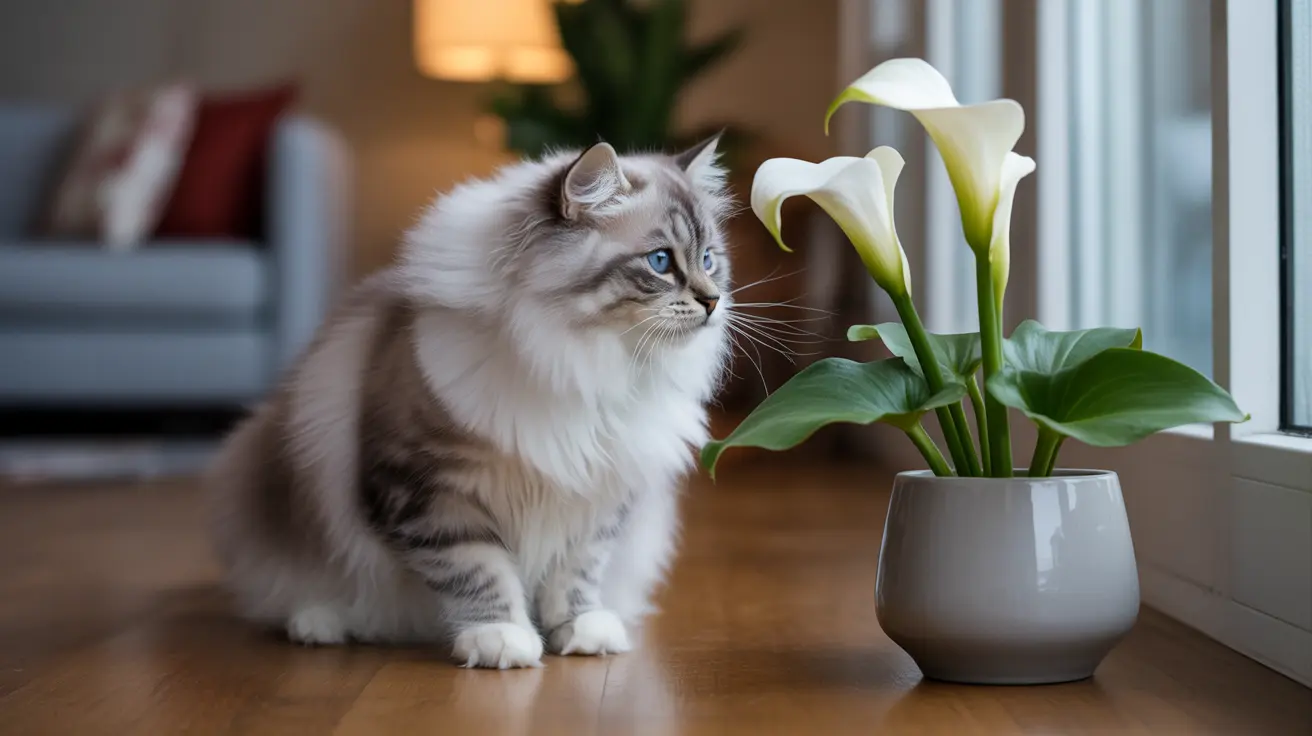Understanding Calla Lily Toxicity
If you're a cat owner, you've likely wondered, "Are calla lilies poisonous to cats?" The short answer is yes - calla lilies are indeed toxic to our feline friends, though not as lethal as some other lily varieties. These elegant flowers contain insoluble calcium oxalate crystals that can cause significant discomfort and pain when ingested.
While calla lilies won't cause the devastating kidney failure associated with true lilies, they can still create serious health issues for cats. Understanding the specific risks and symptoms is crucial for every cat owner.
How Calla Lilies Affect Cats
When a cat bites or chews on any part of a calla lily, the calcium oxalate crystals immediately begin causing irritation. These microscopic crystals penetrate the sensitive tissues in the mouth, throat, and digestive tract, leading to intense discomfort and inflammation.
Common Symptoms of Calla Lily Poisoning
- Immediate oral pain and burning sensation
- Excessive drooling
- Pawing at the mouth
- Difficulty swallowing
- Vomiting
- Loss of appetite
- Swelling of the tongue and lips
True Lilies vs. Calla Lilies: Important Differences
It's crucial to understand that calla lilies, despite their name, are not true lilies. True lilies (like Easter lilies, Tiger lilies, and Stargazer lilies) cause fatal kidney failure in cats. Calla lilies, while toxic, primarily cause localized irritation and gastrointestinal upset.
This distinction is vital because while calla lily exposure requires prompt attention, it's generally not a life-threatening emergency like true lily poisoning.
Emergency Response and Treatment
If your cat has encountered a calla lily, immediate action is necessary. Remove any plant material from their mouth if possible, and rinse their mouth gently with water. Contact your veterinarian or the ASPCA Animal Poison Control Center (888-426-4435) right away.
Treatment Options
- Mouth washing to remove crystal residue
- Pain management medications
- Anti-inflammatory drugs if needed
- Supportive care and monitoring
- Fluid therapy in cases of severe vomiting
Prevention and Home Safety
The best way to protect your cat is to keep calla lilies out of your home entirely. If you receive flowers as a gift, carefully check the arrangement for calla lilies and other toxic plants before displaying them.
Consider creating a cat-friendly garden with safe alternatives like roses, sunflowers, or zinnias. Always research plants before bringing them into your home environment.
Frequently Asked Questions
Are calla lilies poisonous to cats and what symptoms should I watch for if my cat chews on one?
Yes, calla lilies are poisonous to cats. Watch for immediate signs of oral discomfort, excessive drooling, pawing at the mouth, vomiting, and difficulty swallowing. These symptoms typically appear shortly after exposure.
How dangerous are calla lilies compared to true lilies for cats?
While toxic, calla lilies are less dangerous than true lilies. Calla lilies cause painful irritation and gastrointestinal upset but don't lead to kidney failure like true lilies (Easter, Tiger, or Stargazer lilies).
What immediate steps should I take if my cat has ingested part of a calla lily?
Remove any plant material from your cat's mouth, rinse their mouth with water if possible, and contact your veterinarian or the ASPCA Poison Control Center immediately for guidance.
Can calla lily poisoning in cats cause kidney failure or is it limited to oral irritation?
Calla lily poisoning is typically limited to oral irritation and gastrointestinal upset. Unlike true lilies, calla lilies do not cause kidney failure in cats.
How can I prevent my cat from being exposed to calla lilies in the home or garden?
The best prevention is to keep calla lilies out of your home and garden entirely. Check all flower arrangements before bringing them inside, and create pet-safe gardens using non-toxic plants.
Conclusion
While calla lilies pose a significant risk to cats, understanding the nature of their toxicity helps owners respond appropriately. Unlike their more dangerous relatives, true lilies, calla lily poisoning is manageable with prompt veterinary care. However, the best approach is always prevention - keeping these beautiful but potentially harmful plants out of reach of your curious feline companions.






